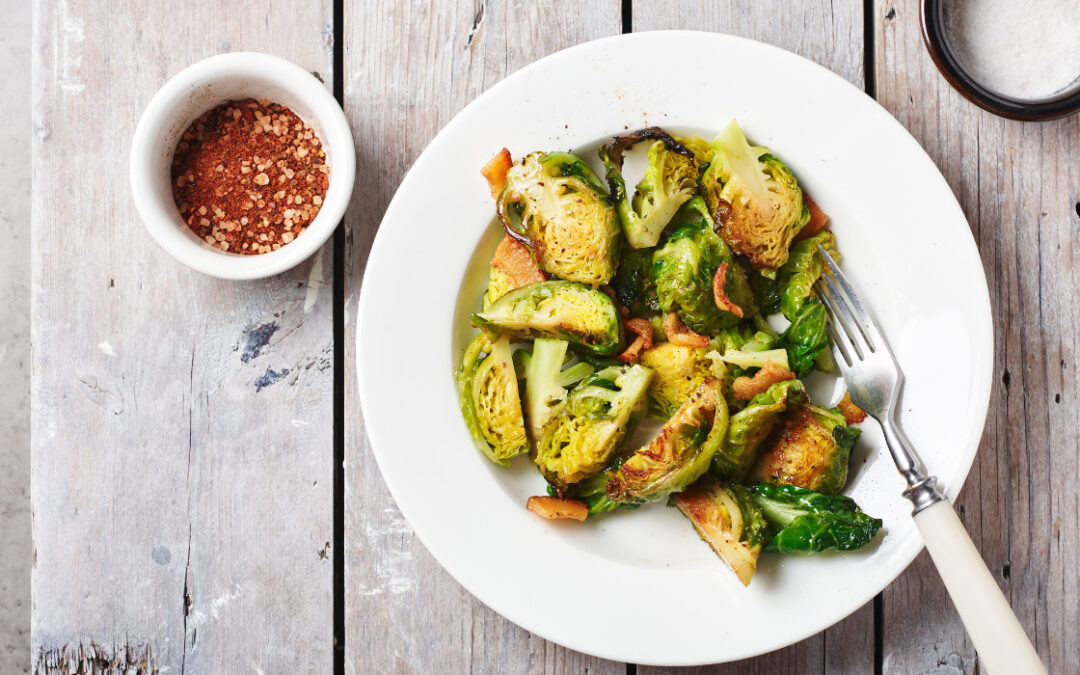Brussel Sprouts are really healthy food as they are incredibly healing to your body. Brussel sprouts are very alkaline and rich with Micro and Macro nutrients along with fibers.
Remember: Any food which is plant-based, not processed and natural, alkaline, water-rich, fiber-rich, and very low in calories while very high in nutritional value is like using your food as a Medicine.
Eating Brussels sprouts helps protect against cancers of the Stomach, Lungs, Kidney, Breast, Bladder, and prostate.
It will also benefit in helping with other health issues like High Blood Pressure, High Cholesterol, Diabetes and Heart Disease.
Why are Brussel sprouts such an awesome and healing food?
Brussels Sprouts contain a natural, sulfur-based substance, Glycosinolate Glucobrassicin, that prevents damage to your DNA. That is how it helps prevent cancer. It may also stop new
blood vessels from growing inside the tumors.
Brussels are high in vitamin K which helps your blood clot. For this reason, it’s important to check with your health care provider if you are on a blood thinner.

Brussels sprouts have a type of carbohydrate that your body may not be able to easily break down, and this may cause belly pain, gas, and either diarrhea or constipation. You may want to watch out if you have IBS (irritable bowel syndrome).
Here are some of the facts:
½ cup of cooked Brussels Sprouts has 28 calories, 2 grams of Protein, 5.5 Grams of Carbohydrates, 2 Grams of Fibers, Vitamin K 91% of Daily Value (DV), Vitamin C 53% of the DV, Folate 12% of DV.
It also contains a small amount of Vitamin B6, Potassium, Iron, thiamine (Vitamin B1), magnesium, and phosphorus.
I am a firm believer in using our food as medicine so we never have to use medicine as our food. If you eat Whole Food Plant-Based (WFPB) natural foods, you will see how your body starts healing, and you can get rid of your health challenges and live a normal life without medication. There are so many foods that can fight health challenges, balance our sugar, and help with inflammation.
All without having to take a pill.
Incorporate Brussels sprouts along with WFPB, sparingly some nuts, legumes, beans, and some sprouts to feel the energy and vitality for your long-life span of Health, fitness, and happiness.
Conclusion
In conclusion, Brussels sprouts are a highly nutritious and healing food that offers various health benefits. Their alkaline nature, rich nutrient content, and potential cancer-fighting properties make them a valuable addition to a balanced diet. Incorporating Brussels sprouts and other whole food plant-based options can lead to improved well-being and overall health.
Frequently Asked Questions (FAQ):
Are Brussels sprouts good for preventing cancer?
Yes, Brussels sprouts contain Glycosinolate Glucobrassicin, a natural substance that helps prevent damage to DNA and inhibits the growth of blood vessels within tumors. These properties contribute to their potential in protecting against various cancers, such as stomach, lung, kidney, breast, bladder, and prostate cancer.
Can Brussels sprouts help with high blood pressure and cholesterol?
Yes, Brussels sprouts are beneficial for individuals with high blood pressure and cholesterol issues. Their nutrient-rich composition, including fibers and other essential nutrients, can contribute to better heart health and cholesterol management.

Are Brussels sprouts suitable for those with irritable bowel syndrome (IBS)?
Brussels sprouts contain a type of carbohydrate that may be difficult for some individuals to digest, potentially causing belly pain, gas, diarrhea, or constipation. If you have IBS or similar digestive sensitivities, it’s advisable to consume Brussels sprouts in moderation and observe how your body responds.
How many calories and nutrients do Brussels sprouts contain?
Half a cup of cooked Brussels sprouts provides approximately 28 calories, 2 grams of protein, 5.5 grams of carbohydrates, and 2 grams of fiber. It is also a good source of vitamin K (91% of the Daily Value), vitamin C (53% of the DV), and folate (12% of the DV). Additionally, Brussels sprouts contain small amounts of vitamin B6, potassium, iron, thiamine (Vitamin B1), magnesium, and phosphorus.
Can Brussels sprouts replace the need for medication entirely?
While incorporating Brussels sprouts and other whole food plant-based (WFPB) natural foods into your diet can significantly improve your health and reduce the need for medication in some cases, it’s essential to consult with your healthcare provider before making any significant changes to your treatment plan. Nutrition can play a vital role in preventive health, but individual medical conditions vary, and professional advice is crucial for optimal care.

